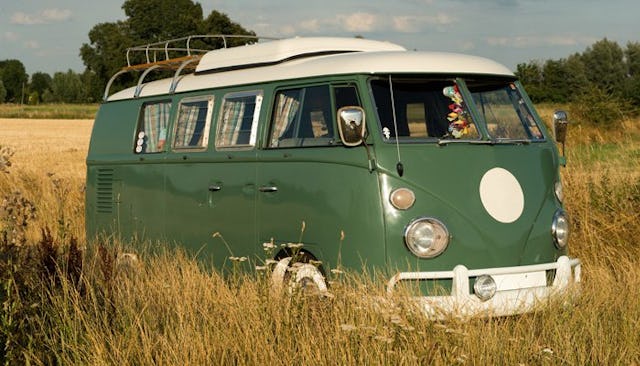The Existentialism Of Parenthood

I was the first one pregnant in our generation on either side of our family. From those first weeks of confessing my pregnancy, I ran up the steep hill of all the things I would learn about what it took to parent: diapers, Pack ‘n Plays, how to know if the baby is sick.
Then they grow up a little.
You work on which vacuum has a large enough bore to suck up Cheerios without clogging, teaching yourself to say “sugar!” instead of “shit” and truisms like, “Hands are not for hitting.”
Mysteriously, I discovered along the way that I absolutely love parenting, not the least of which is the way its existential challenges never cease to amaze me. This month’s challenge: answering the question, “Mom, what is a hippie?”
My 5-year-old said, “It means ‘an old man.'” His 8-year-old brother corrected him: “No, it’s a teenager with long hair…and funny clothes…and…” He then accurately described Shaggy from Scooby-Doo, then finally faltered, breaking down to ask, “Mom, what is a hippie?”
Here, parenting becomes existential, because even in their little-boy ways, they were grasping at something they could not articulate but could sense. They got that there was some socio-political, socio-historical implication behind the meaning of the word—that it signified something they did not understand for there to be a hippie in their cartoon.
I began to answer, but any explanation of what a hippie is means nothing without understanding the context of the culture they were rebelling against. In our current environment, where the two long-haired boys on my sons’ baseball teams are the sons of fashionista mamas, not grunge, how can they get what a statement it was for a guy to let his hair and beard grow shaggy in an era when hair didn’t touch one’s collar? When men and women still wore hats in public, and my grandmother and even my mother still carried spotless white gloves?
Our kids know hippie images as neon flowers on paper cups and napkins at the party store or the peace signs in rhinestones on the neighbor’s jeans; they don’t see them as re-imagined icons of what was once a radical attempt to move toward a gentler, more natural way of being at a time of corporatization and war. How do you explain the experience that I remember intangibly as paper butterflies on my young aunt’s wall fanning out above her black-and-white poster of Bridge Over Troubled Water?
I was not a hippie or a flower child or even a child of hippies; my parents were primly Republican. As a child, I associated hippies with broken bottles on the pavement at our playground. Yet here I am at 40, riding along in my SUV with little boys rattling about in the back who are fascinated we did not have to wear seat belts as kids, feeling a wan tenderness in memory of avocado kitchen appliances and trying to remember what the whole affection for rainbows was about.
My world has become larger with children—not just because more square-footage is required to be able to move around high chairs and train tables and strewn Legos, but because the whole expanse of the universe is new to me again in their eyes.
Soil that clearly belongs nowhere but between the roots of the hedges and flowers outside is now meant to be dug up, spread apart, carried about and stored in little containers that just would not have occurred to me as meant for analyzing dirt. That is, not until your son smiles and explains—proudly pointing—how when he shook the soil in a jar with water, the mulch, peat and sand separated into layers, creating a distinct grey, tan and brown rainbow that he’d just been dying to show someone. He discovered density, you think with pride.
Life is a mystery, full of dark turns and surprises and joys and tragedies and things so beautiful and amazing. You go on vacation and see a sunset or a painting or a giant gorge in the earth so startlingly beautiful that you honestly could not have borne seeing it without someone meaningful beside you to touch and say, “Look at that!”
But children find this not only on vacation, but in the mundane, the sagging days of life that might otherwise be only about when to fit in grocery shopping and whether or not a successful day at work was enough to qualify for a bonus and if you will be able to sleep soundly tonight. “Look!” they say, all the time. “What is that? Look!” They pick out the plainest flower at the market and fall in love with it. You find rocks in the bottom of your purse, a wilted feather left for you beside your bed, stray bits of hardware clanking in your dryer.
And they take what we have known always in our lives—something as irrelevant and silly as the word hippie—and hand us a whole cosmos of depth and meaning to wrestle with.
“What is a hippie?” I repeated, ready to say something about how people sometimes choose their clothes to express their feelings about the world or maybe share something about what it was like to be a child in the ’70s or how the times then were or weren’t like our times now. But they were laughing at something.
Just at the point they had me thoroughly wrapped up in the riddle of it all, the boys moved on. In the same effortless way they expand our lives with depth and complexity, they model simplicity: My boys decided that “hippie” will be their favorite new word for anything weird, whether or not they really get what it means.
This article was originally published on